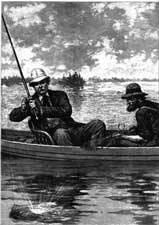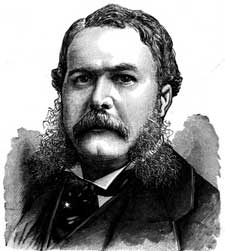Chester Allen Arthur became the twenty-first President of the United States (1881-1885) when James Garfield was assassinated. Arthur was the fourth Vice President to succeed to the presidency. There was some debate over his birthplace, and some claimed he was actually a Canadian who had assumed the identity of an American-born brother who had died; but the allegations were never proven. It is quite possible, however, that his vanity caused him to claim he was a year younger than he actually was. Chester Arthur never won an election of any kind. All of his service came through political appointments.

Born in Fairfield, Vermont on October 5, 1829, Arthur studied law and had a successful practice in New York City. He was an ardent abolitionist who won several cases in favor of the "runaway slaves" he was defending. Before the Civil War, Arthur also won two important Civil Rights cases, one of which decided that slaves were free once they reached New York, and the other of which clarified that blacks had the same rights as others to ride street cars. In that case he won $500 in damages for a black woman who was thrown off a New York City bus. While practicing law Chester Arthur continued his education.

 As the Civil War approached, Arthur was assigned the position of New York's Quartermaster-General, which put him in charge of supplying the state's volunteer troops. He was given the rank of brigadier general and was to be called General all his life. His excellent and efficient handling of the job earned him an important place in the state's Republican organization. In 1831, President Grant appointed Arthur Collector of the Port of New York. While there, he utilized his 1,000 employees to further the partisan interests of the Republican Party, such patronage being typical Grant's appointments. He was removed from the Republican Party machine of New York City in 1878 after abusing his position as the collector of the New York Custom House. In spite of this blemish, in 1880 the Republican Party nominated him for Vice President, and upon Garfield's death in 1881, he became President. As the Civil War approached, Arthur was assigned the position of New York's Quartermaster-General, which put him in charge of supplying the state's volunteer troops. He was given the rank of brigadier general and was to be called General all his life. His excellent and efficient handling of the job earned him an important place in the state's Republican organization. In 1831, President Grant appointed Arthur Collector of the Port of New York. While there, he utilized his 1,000 employees to further the partisan interests of the Republican Party, such patronage being typical Grant's appointments. He was removed from the Republican Party machine of New York City in 1878 after abusing his position as the collector of the New York Custom House. In spite of this blemish, in 1880 the Republican Party nominated him for Vice President, and upon Garfield's death in 1881, he became President.

 During the eleven weeks that President Garfield hung between life and death, Arthur was cautious. Garfield's assailant had claimed to have shot Garfield so that Arthur would become President, which made the country a bit leery of him. As President, however, Chester Arthur surprised both friends and enemies when he followed his own light and called for both Civil Service reform and sound monetary policies. He fought to have the income tax abolished and tariffs, except on tobacco and alcohol, lowered. He vetoed a Chinese exclusion bill, which violated a treaty with China; and he vetoed a wasteful rivers and harbors bill, which Congress managed to pass in spite of the veto. Going against his Republican Party, he supported the first comprehensive United States Civil Service legislation, which started a new era of reform in national politics. He was also the first President to have the White House renovated. During the eleven weeks that President Garfield hung between life and death, Arthur was cautious. Garfield's assailant had claimed to have shot Garfield so that Arthur would become President, which made the country a bit leery of him. As President, however, Chester Arthur surprised both friends and enemies when he followed his own light and called for both Civil Service reform and sound monetary policies. He fought to have the income tax abolished and tariffs, except on tobacco and alcohol, lowered. He vetoed a Chinese exclusion bill, which violated a treaty with China; and he vetoed a wasteful rivers and harbors bill, which Congress managed to pass in spite of the veto. Going against his Republican Party, he supported the first comprehensive United States Civil Service legislation, which started a new era of reform in national politics. He was also the first President to have the White House renovated.
Chester Arthur's greatest achievement as President was signing the Pendleton Civil Service Reform Act on January 16, 1883. This act was passed in response to the discovery that Post Office officials and stagecoach operators had come up with a plan to steal millions of dollars from the United States government. It was the Pendleton Act that established the Civil Service Commission. It also established the merit system, whereby government jobs were given based on a person's ability instead of a person's politics. Prior to that, government jobs were often given as rewards for political loyalty, a practice that had resulted in widespread fraud and corruption. Arthur also strengthened the United States Navy.
His signing of the Pendleton Civil Service Reform Act and vetoing of the Rivers-and-Harbors Appropriation Bill and the bill that discriminated against Chinese immigrants caused Arthur to lose the support of the Republican Party. This cost him the nomination for a second term. It was of little consequence. Arthur had known for some time that he was seriously ill with a kidney disease, but had managed to hide the fact.

On November 18, 1886, just eighteen months after leaving office, Chester Arthur died in New York City. Mark Twain noted that the man was a fair and good President and that he should be remembered as such.
Arthur, who was nicknamed the "Gentlemen Boss," and enjoyed the finer things in life. He traveled extensively during his presidency. He attended the opening of the Brooklyn Bridge and toured both Florida and Yellowstone National Park. During his presidency the United States celebrated the 100th anniversary of the Yorktown surrender, and many cities and towns adopted the use of Standard Time after the railroad established time zones.
|

